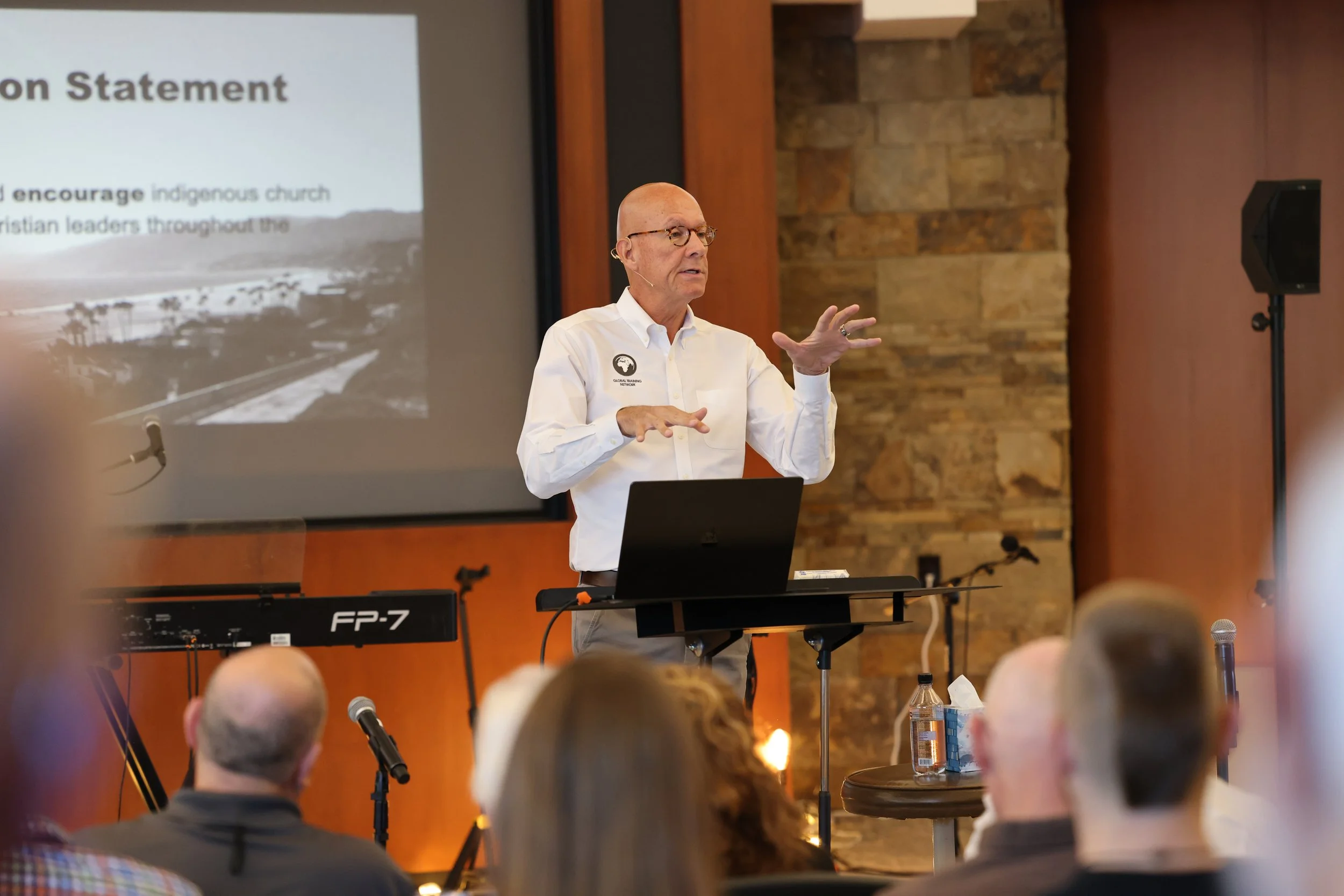About Paul
Paul Madson is the founder and president of Global Training Network (GTN), an interdenominational ministry dedicated to equipping indigenous pastors and leaders across the majority world. Since its founding in 2004, GTN has grown to over 200 U.S.-based staff serving in 87 countries.
Before launching GTN, Paul spent 25 years in pastoral ministry as an associate pastor, church planter, and senior pastor. His passion for global ministry stems from a calling to invest in leaders lacking access to quality biblical and theological training—an urgent need, with 85% of Majority World pastors receiving little or no formal education.
Paul holds degrees from Arizona Christian University (B.A.) and Western Seminary (M.Div.), and recently earned his Ph.D. in Organizational Leadership from Columbia International University.
He and his wife, Lisa, have been married for over 40 years and live in the Phoenix area. They have three adult children, four grandchildren. Paul enjoys reading, running, hiking, photography, and sports.
Q&A
-
The inspiration to begin GTN came during my 25 years of pastoring, when I traveled to bring biblical training to underresourced pastors in South Asia. I saw that most Indigenous pastors had no formal biblical or theological training and very little (if any) informal biblical training. I pictured 10 people carrying a heavy log, nine at one end and only one at the other end. This was a mental picture of the availability of quality biblical and theological education in the Western world (nine) vs the Majority World (one). I felt called to spend the second half of my life investing in the next generation of young church planters, pastors, and Christian leaders in the places around the world where the need was the greatest.
-
Because of the combination of such high poverty rates and lack of access to quality biblical and theological education, it becomes incredibly difficult for young pastors to learn the basics of theology and healthy church leadership. GTN brings quality biblical and theological training to indigenous pastors in their regions for one week of training per quarter for three years. Our training focuses on the Head (theology and bible), Heart (character), and Hands (pastoral and leadership skills).
-
The list would be long, but my brief answer would be that leaders should never lose sight of faithfulness over the long haul. It’s not the size of our ministry that matters most, but rather, have we been faithful to what God has called us to? We are responsible for the depth of our life. God is responsible for the breadth of our ministry.

-
Since my early days of following Christ, I have developed rhythms and routines that help keep me centered on what matters most. Those routines (habits) are spiritual preparation in the morning and reflection upon the day in the evening. I spend my mornings in Scripture, prayer, reading, and journaling. This sets my heart and mind for the day. I evaluate the day in the evening as I reflect on what went well, what didn’t go so well, and what I need to change.
Lifelong learning is also a commitment that I think is essential to remain effective in ministry through all the different seasons of life.
I would also add the importance of physical exercise to keep ourselves not only physically healthy, but also emotionally and mentally healthy. I practice long-distance running for cardio and isometric exercises to keep my muscles strong.
-
The following authors have shaped my thinking in both life and ministry.
Alcorn, Randy
Bridges, Jerry
Carson, D.A.
Chapell, Bryan
DeMoss, Nancy Leigh
Dever, Mark
Edwards, Jonathan
Elliott, Elisabeth
Hansen, Collin
Henry, Carl F.H.
Houston, James
Horton, Michael
Hughes, R. Kent
Keller, Tim
Lewis, C.S.
Lloyd-Jones, D. Martyn
Murray, Ian H.
Noll, Mark
Ortlund, Ray
Ortlund, Gavin
Owen, John
Packer, J.I.
Piper, John
Schaeffer, Francis A.
Sproul, R.C.
Spurgeon, Charles
Stetzer, Ed
Stott, John R.W.
Stowell, Joseph
Tripp, Paul
Wells, David R.
Yancey, Philip
Willard, Dallas
The most influential people on this list have been: Tim Keller, Jerry Bridges, C.S. Lewis, John Stott, and J.I. Packer
-
You can win the battle but lose the war. In my early years of ministry, I fought too many battles on hills that, in the end, didn’t matter. I majored in the minors, split theological hairs, won arguments—but lost relationships.
Those experiences taught me a painful but invaluable lesson: if I’m going to err, I’d rather err on the side of grace. Learning to major on the majors and minor on the minors isn’t just wisdom—it’s a spiritual discipline. The enemy loves nothing more than to see Christians obsess over minor issues or neglect the essentials. Either way, he’s won.
That’s why theological triage is an essential skill for every pastor and leader. It helps us discern what’s primary, what’s secondary, and what’s peripheral. And it honors the heart of Christ’s prayer in John 17:20–21, where He pleads:
“My prayer is not for them alone. I pray also for those who will believe in me through their message, that all of them may be one, Father, just as you are in me and I am in you. May they also be in us so that the world may believe that you have sent me.”
He goes on to say in verse 23 (paraphrased):
“…May they experience such perfect unity that the world will know that you sent me and that you love them as much as you love me.”
Likewise, in John 13:34–35, Jesus commands:
“A new command I give you: Love one another. As I have loved you, so you must love one another. By this everyone will know that you are my disciples, if you love one another.”
And the Apostle Paul echoes this call to unity in Philippians 2:2–4:
“…then make my joy complete by being like-minded, having the same love, being one in spirit and of one mind. Do nothing out of selfish ambition or vain conceit. Rather, in humility value others above yourselves, not looking to your own interests but each of you to the interests of the others.”
Unity, humility, and love are not optional—they are marks of maturity. Learning what matters most, and letting go of what doesn’t, is how we reflect Christ to the world.
-
Lisa and I will take evening walks together and debrief from our day. We enjoy special date nights out each week. We communicate a lot, talking through the ups and downs of life. We also enjoy visiting high mountains, lakes, and rivers, especially throughout the Western United States. Ministry can be all-consuming if a person isn’t careful. We set boundaries to maintain our personal time and don’t feel the need to apologize.
-
The church throughout the Majority World has humbled me as I have witnessed these beautiful indigenous people who have next to nothing to live on, but everything (because of Jesus) to live for. Even in poverty, they have a joy that springs from their hearts and is expressed beautifully in their smiles.
I have been reminded that, at their core, human beings — no matter the continent or culture — are all basically the same. We all have desires, dreams, hurts, and heartaches. We all want to be loved, valued, and accepted. We are all broken from sin and need God’s redeeming grace and mercy every day.
-
I enjoy reading (biographies and history in particular), running (half-marathons), hiking in the mountains, photography (landscapes and cityscapes), and sports (I love watching a really good athletic contest). Spending time with my grandkids always brings joy and a smile to my face. These are all healthy ‘diversions’ for my mind and help me to recharge for the next season of ministry.



